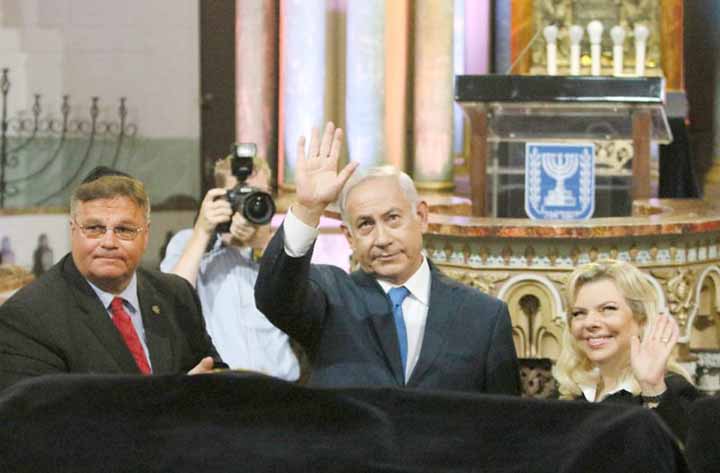
AFP, Vilnius :
Israel’s prime minister says he sees a path to peace with Palestinians through the “normalisation” of relations with Arab states which, like his country, are also facing an emboldened Iran.
“Many Arab countries now see Israel not as their enemy but as their indispensable ally in pushing back Iranian aggression,” Prime Minister Benjamin Netanyahu said in an interview with Lithuania’s LRT public broadcaster which aired on Monday.
“This has created normalisation which can lead to peace. I believe that if we have peace with the broader Arab world, it will help us get to peace with the Palestinians,” he added in the interview taped during his visit to the Baltic state-the first-ever by an Israeli premier-that ended on Sunday.
Israel has peace treaties with just two Arab countries, Egypt and Jordan, while others insist on an agreement with the Palestinians as a prerequisite that would pave the way to formal relations.
Earlier this year Saudi Arabian King Salman reaffirmed “steadfast” support for the Palestinian cause after Crown Prince Mohammed bin Salman signalled a shift in the country’s approach.
Prince Mohammed in April said in a magazine interview that Israelis, as well as Palestinians, “have the right to have their own land”. Both Israel and Saudi Arabia have opposed the Iran nuclear deal and pushed for tougher action against Iran’s spreading influence in the Middle East.
In July, the Saudis slammed a controversial Israeli law as “perpetuating racial discrimination” against Palestinians by defining the country as the nation-state of the Jewish people.
Arab citizens account for some 17.5 percent of Israel’s more than eight million population and have long complained of discrimination.
The Israeli legislation was also condemned by the six-nation Gulf Cooperation Council, comprised of Saudi Arabia, Bahrain, Kuwait, Oman, Qatar and the United Arab Emirates.
At least 171 Palestinians have been killed by Israeli fire during demonstrations near the border with Israel that began in March amid a humanitarian crisis in the Gaza Strip.
Jerusalem (AFP) – Israeli forces demolished the home of a Palestinian who carried out a deadly knife attack in a settlement in the occupied West Bank, the army said Tuesday.
Minor clashes broke out between Palestinians opposed to the raid and soldiers in the West Bank during the early hours of Tuesday morning, the military and witnesses said.
The family home was destroyed, an AFP journalist at the scene said.
The army said its forces “demolished the residence of the terrorist Mohammed Dar Youssef from the village of Kobar, north of Ramallah.”
Dar Youssef snuck into the Adam settlement south east of Ramallah in July, stabbing three Israelis, one fatally, according to the Israeli authorities.
He was then shot dead by a local resident.
Israeli Defence Minister Avigdor Lieberman said on Twitter on Tuesday he had kept the promise made to the widow and other relatives of Yotam Ovadia, the victim of the Adam attack, to destroy the house quickly.
The stabbings also led Lieberman to pledge to build more settler homes in response.
Israel authorised plans for more than 1,000 new homes in settlements in the occupied West Bank on August 22, including 370 in the Adam settlement.
Israel rejects the widely held view that settlement expansion is one of the greatest obstacles to peace with the Palestinians.

